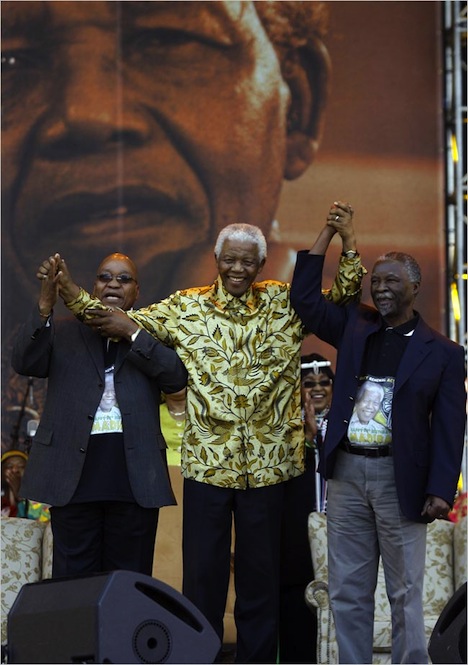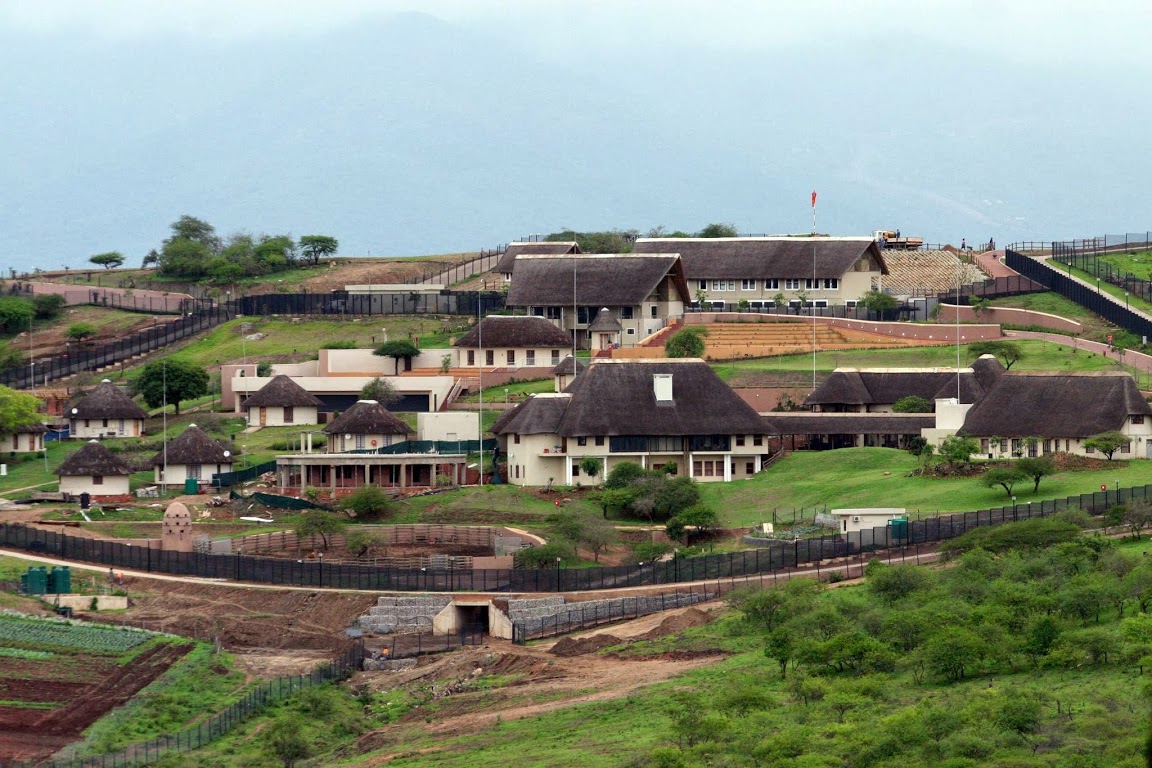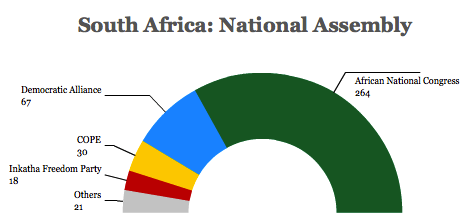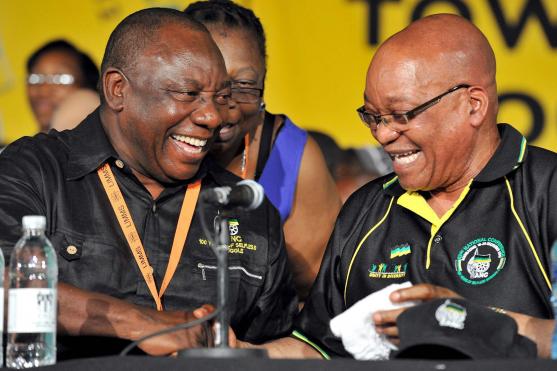
No one could have filled the shoes of Nelson Mandela, the first president of post-apartheid South Africa — not that either of his successors in recent years tried particularly hard to do so. 
Thabo Mbeki (pictured above, right, with Mandela), who served as Mandela’s competent executive during Mandela’s term as South African president between 1994 and 1999, became known during his own decade in office as the world leader who refused to admit the connection between HIV and AIDS long after the scientific community established that the human immunodeficiency virus is the proximate cause of AIDS.
Jacob Zuma (pictured above, left, with Mandela), who followed Mbeki into the presidency after the 2009 general election, came to power virtually synonymous with illegality after surviving criminal charges for rape and for corruption in the mid-2000s. Mbeki himself was forced to resign in September 2008 as president because of allegations that he interfered in the judicial process on behalf of Zuma.
With a general election due in spring 2014, however, Mandela’s death presents both an opportunity and a challenge to South African politics. Mandela’s absence means that the space is once again open for a South African leader to inspire the entire nation without facing the inevitable comparison to one of the world’s most beloved figures. But it also marks the end of post-apartheid South Africa’s honeymoon, and so Mandela’s passing also represents a challenge to the new generation of political leadership — to dare to bring the same level of audacious change to South Africa that Mandela did. Nothing less will be required of South Africa’s leaders to keep the country united and prosperous in the decades to come — to ensure that South Africa continues to be, as Mandela memorably stated in his 1994 inaugural address, ‘a rainbow nation, at peace with itself and the world.’
South Africa today remains the jewel of sub-Saharan Africa, in both humanitarian and economic terms. Mandela’s release from prison and the largely peaceful negotiation of the end of apartheid in Africa alongside F.W. de Klerk, South Africa’s president from 1989 to 1994, rank among the most memorable events of the 20th century. The constitution that Mandela helped to enact in 1996 is one of the world’s most progressive in terms of human rights — it purports to grant every South African the right to human dignity, to health care and water, to work, to a basic education, to housing. Even if the rights promulgated in the South African constitution today remain more aspirational than functional, the constitution was pathbreaking in it breadth. It’s notable that in 2006, South Africa became the fifth country in the world to allow same-sex marriage.
With an economy of $579 billion (on a PPP basis, as of 2012, according to the International Monetary Fund), South Africa has the largest economy on the entire African continent, despite the fact that its population of 53 million is dwarfed by the populations of the Democratic Republic of the Congo (67.5 million), Ethiopia (86.6 million) and Nigeria (a staggering 173.6 million).
Its GDP per capita of $11,281 (again on a PPP basis and as determined by the IMF as of 2012) is exceeded in sub-Saharan Africa only by oil-rich Gabon ($18,501) and tourism hotspot Botswana ($15,706), and it far outpaces the fourth-ranked Namibia ($7,500) and the fifth-ranked Angola ($6,092), another petrostrate. Even that understates South Africa’s economic dominance, because both the Botswanan and Namibian economies have flourished in large part due to trade with the South African economy.
But that doesn’t mean all is perfectly well. Nigeria seems likely to outpace South Africa to become the largest sub-Saharan African economy soon, if it hasn’t already. Despite its status as Africa’s economic powerhouse, South Africa suffered its first post-apartheid recession in 2009, and the recovery hasn’t been particularly strong. South African GDP grew just 2.2% last year and growth remained sluggish this year, too. Unemployment is creeping downward, but it’s still a whopping 24.7% as of the third quarter of 2013. Different studies make it difficult to know whether poverty is rising or declining, but wealth among South African whites is massively higher than wealth among South African blacks, and income inequality is rising sharply in South Africa (as in much of the rest of the world).
Clashes between miners and South African police during last summer’s Marikana strike left 34 people dead, shocking both South Africa and the world with the kind of violent images that hadn’t been seen in South Africa since the apartheid era.
With an estimated HIV/AIDS rate of 17.5%, South Africa has the world’s fourth-highest HIV prevalence after neighboring Swaziland, Lesotho and Botswana. Though we now recognize Mandela as one of the world’s most prodigious activists in the campaign against HIV/AIDS, the issue wasn’t at the top of his agenda as president, a failing that Mandela acknowledged after leaving office. In retirement, however, Mandela took up the cause with vigor (especially after his own son Makgatho died from AIDS complications in 2005). His forceful push at the 2000 AIDS conference in Durban muted the criticisms of the Mbeki government and paved the way for greater treatment options for all Africans, including South Africans. But the much-delayed fight against HIV/AIDS represents one of the starkest failures of post-apartheid South Africa. Continue reading How Nelson Mandela’s death provides South Africa a challenge and an opportunity →

![]()




